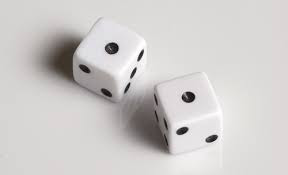They just haven't hit. There's more complicated analysis that we can go through, but the Astros are down 3 games to 1 in the World Series because they have scored only 11 runs in the 4 games than they have played. In their two games in Atlanta, they have scored 2 runs, losing a pair of games in which the pitching staff held the Braves to only 5 runs. With an offense as good as the Astros, that should be more than enough.
It is easy to find speculation, quick fix solutions, armchair psychology from Astro fans on social media, text threads, and conversations at sports bars across Houston. Some of these discussions may be right, but most are wrong. Most are attempt to apply some type of theory or explanation to something that is simply what happens in a short samples.
Baseball games are turns of probability, and teams to try acquire and develop players who stack the dice in their favor. Better hitters are more likely to get on base, though most of the time they make outs. And sometimes those outs get strung together so that few runs are scored. Even for the best teams, the dice sometimes come up snake eyes.
 |
| The Astros offense in the World Series |
The Astros scored 863 runs in the regular season, the most of any team in baseball. They averaged 5.33 runs a game, and led the majors in batting average, on base percentage, hits, and lowest strikeout rate. They are, by any definition, an excellent offense.
And yet, on 16 different occasions during the regular season they scored 11 runs or fewer in a 4 game stretch. They did it 4 times in April--as part of that slump driven in part by the COVID outbreak that put a number of starters on the IL-- twice in July, twice in August, and on 8 different occasions in the month of September.
Of course, on 22 different occasions during the regular season, the Astros scored 30 or more runs in a 4 game stretch. They did it 4 times in April, 7 times in June, twice in July, 3 times in August, and 6 times in September. They are a good offense, so it's not surprising that they have more good stretches than bad stretches.
With all of this being said, I'm not sure that taking such a long view is all that comforting. In the Great Depression, FDR's relief administrator Harry Hopkins had a pithy response for those who thought the economy would sort itself out in the long run, "People don’t eat in the long run. They eat every day."
The issues with the Astros offense are not a serious as those of feeding the unemployed masses in the Great Depression, but from a baseball standpoint, the issue is just as serious. The Astros offense will sort itself out over the long run, but the Astros have to score today, in Game 5 of the World Series. They need runs and need them now.
So instead of focusing on numbers, perhaps I should focus on narrative. Let's talk about the Astros worst offensive stretch of the season. On July 7, they won the middle game of a homestand against the A's 4-3. That would be the offensive highpoint for a few days. They scored 1 run in a loss to the As the next day, and then were shutout in Minute Maid Park twice in a row by the Yankees. Things didn't look much better in the finale against the Yankees, as they scored only 2 runs in the first 8 innings.
But the Astros have a good offense. In the bottom of the ninth, they struck for 2 singles, 3 doubles, and 1...well, you'd rather watch this than have me tell you about it right.
They broke out of their biggest slump with their biggest regular season win. No reason they can't do it again tonight.
Comments